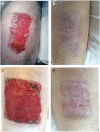Bacteriophage Therapy as a Potential Management Option for Surgical Wound Infections
- PMID: 36147826
- PMCID: PMC9041461
- DOI: 10.1089/phage.2020.0010
Bacteriophage Therapy as a Potential Management Option for Surgical Wound Infections
Abstract
To investigate the potential role of bacteriophages in the treatment of surgical infections, we conducted a retrospective analysis of four surgical patients who have sought treatment at the Eliava Phage Therapy Center, Tbilisi, Georgia. Two patients had chronic osteomyelitis, one presented with a diabetic foot ulcer, and the fourth patient had developed a severe infectious complication after skin grafting surgery. Patients were treated with different combinations of bacteriophage preparations, based on the sensitivity of the isolated bacterial strain toward commercially available bacteriophages. The treatment lasted on average for 1 month, and positive results were obtained in all four cases: the wounds have healed, the general health status of the patients has improved. No allergic or adverse reactions have been observed throughout the treatment.
Keywords: Eliava; antibiotic resistance; bacteriophage; phage therapy; surgical infections; wound healing.
Copyright 2020, Mary Ann Liebert, Inc., publishers.
Conflict of interest statement
LN, NH, DN, and NP are paid employees of the EPTC, but otherwise have no financial interest in phage therapy. Remaining authors do not have any relevant competing interests or disclosures.
Figures




References
-
- Khan HA, Ahmad A, Mehboob R. Nosocomial infections and their control strategies. Asian Pac J Trop Biomed. 2015;5:509–514.
-
- Summers WC. Bacteriophage therapy. Annu Rev Microbiol. 2001:55:437–451. - PubMed
-
- Osborne L. A Stalinist antibiotic alternative. The New York Times. 2000;6:1–8.
-
- Ibrahim OM, Sarhan SR, Salih SI. Activity of isolated staphylococcal bacteriophage in treatment of experimentally induced chronic osteomyelitis in rabbits. Adv Anim Vet Sci. 2016;4:593–603.
LinkOut - more resources
Full Text Sources
